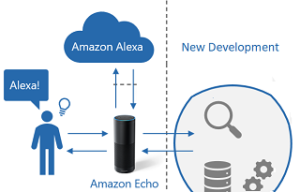
Alexa: Amazon personal assistant
It may not seem like a new phenomenon in technology since there are wizards like Siri, Cortana or Google Now, but the fact that this wizard is really personal, that’s why I called the others for voice assistants, is the fact that it learns and stores the data in a private cloud from Amazon Web Service (AWS).
or Google Now, but the fact that this wizard is really personal, that’s why I called the others for voice assistants, is the fact that it learns and stores the data in a private cloud from Amazon Web Service (AWS).
These personal assistants although all grounded by the use of voice there are differences, they can learn from specific people habits and functions they desire, while the voice assistant, as I call Siri and Google Now now empordered by Dialogflow, as we explained in the post above, they can respond and learn from human interaction, but may, if it is desirable to organize their own database.
Alexa (because I’m the personal assistant I think is masculine, but it can be the same) is centralized in the Amazon cloud and has its own equipment that is Amazon Echo, a column always connected to the Internet via WiFi that is attentive to dialogues of its “owner”.
Streaming music services using Spotify or Pandora, you can read the news of the main newspapers you prefer, inform the weather forecast or the traffic on the way to work, can control all equipment at home that are Smart Home, including it can identify and tell about compatibility, plus its capacity goes beyond.
In addition, it promises to check basic things like solving math accounts or getting into a conversation and even telling jokes, over time this bank and this ability will evolve.
But beware, we have already written here about the myth of singularity (especially the book by Jean Gabriel Ganascia), the idea that this will turn a monster and control you is less true than to individualize and stop talking to friends and relatives









